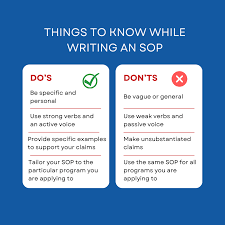



Writing a strong Statement of Purpose (SOP) is one of the most critical components of your application to study abroad. It provides the admissions committee with insights into your personality, motivations, and why you're a good fit for the program. A well-written SOP can significantly strengthen your application. Below are tips and guidelines to help you craft an impactful SOP.
The SOP should explain why you want to pursue a particular program, why you're interested in that specific university, and how this aligns with your long-term career goals.
It’s your chance to present your academic background, professional experience, passion, and how these have shaped your desire to pursue further education.
Organize your SOP into a logical, coherent structure. A typical SOP includes the following sections:
Introduction:
Start with a hook or an engaging introduction that captures the reader's attention.
Briefly state the program and university you are applying to and your primary motivation for pursuing this field.
Academic Background:
Mention your undergraduate or previous academic studies and how they prepared you for the program.
Highlight specific courses, projects, or research that sparked your interest in the field.
Professional Experience (if applicable):
Discuss relevant work experience (internships, jobs, research, etc.) that contributed to your decision to pursue this program.
Explain how your professional experience has given you skills, perspectives, or insights that will help you succeed in the program.
Why This Program:
Explain why the specific program at this university is the best fit for your academic and career goals.
Mention specific courses, professors, or research opportunities that you are excited about.
Career Goals:
Discuss your long-term career goals and how the program aligns with them.
Show how the degree will help you contribute to your field and why you are committed to applying what you learn.
Conclusion:
Conclude by summarizing why you are a strong candidate for the program.
Reinforce your commitment to succeeding in the program and contributing to the university community.
Avoid fluff and be direct about your motivations, goals, and qualifications. Use clear, straightforward language.
The SOP should be about 1-2 pages long (approximately 1000-1500 words), so make every word count.
Customize your SOP for each university and program you are applying to. While the core content might remain the same, be sure to mention specific aspects of the university that drew you to apply.
Mention professors, research facilities, or unique aspects of the curriculum that are relevant to your interests.
Be authentic and reflect your personal journey. What sets you apart from other applicants?
Include experiences, challenges, or perspectives that demonstrate your resilience, passion, and dedication.
Instead of just stating that you're passionate about your field, provide specific examples that illustrate your passion.
For example, rather than saying, "I am very passionate about environmental science," mention a specific project you worked on or a challenge you overcame in this field.
Use anecdotes or stories that demonstrate your growth, learning, and skills.
Do your homework about the program and university. Show that you understand what the program entails and why it’s a great fit for your academic and career plans.
Mention specific research labs, faculty, or program features that align with your interests.
Keep the tone professional and confident, but also show enthusiasm. The SOP is a formal document, so avoid using overly casual language or humor.
Stay positive and focus on how the program will help you achieve your goals, rather than what you hope to avoid or escape from.
Revise your SOP multiple times to ensure it’s polished, well-structured, and free from errors.
Proofread carefully to avoid grammatical mistakes, awkward phrasing, and inconsistencies.
Seek feedback: Ask professors, mentors, or friends to review your SOP. They might provide valuable feedback that you may have missed.
Don’t repeat your resume: Your SOP is not a place to list everything in your resume. It should provide deeper insights into your motivation and aspirations.
Avoid generic statements: Phrases like "I want to study because I love the subject" are too vague. Be specific about why this particular program and university are the best fit for you.
Don’t be too modest or overly confident: While humility is important, it’s also essential to convey confidence in your abilities. Balance is key.
Here's a sample outline to give you an idea of how your SOP could be structured:
Introduction:
"Since my childhood, I have been fascinated by the natural world and the scientific principles that govern it. My interest in environmental science has evolved over the years, and I now aim to pursue a Master’s in Environmental Engineering to deepen my understanding and contribute to sustainable development."
Academic Background:
"During my undergraduate studies in Civil Engineering at XYZ University, I had the opportunity to work on several projects involving renewable energy systems. One particular project on solar energy efficiency sparked my interest in sustainable energy solutions, motivating me to pursue a graduate degree."
Professional Experience:
"After completing my degree, I joined ABC Corporation as a Junior Environmental Consultant, where I was involved in assessing the environmental impact of construction projects. This hands-on experience allowed me to understand the challenges of implementing sustainable solutions in real-world settings."
Why This Program:
"The Master’s program at [University Name] is an ideal fit for me due to its strong focus on both environmental policy and technology. The opportunity to work with Dr. [Faculty Name] on research related to renewable energy will enable me to develop the expertise needed to make meaningful contributions in this field."
Career Goals:
"My long-term goal is to become a leading environmental consultant, specializing in sustainable infrastructure development. I believe that this program will provide me with the knowledge and network to achieve these goals and drive change in the industry."
Conclusion:
"I am confident that my academic background, professional experience, and passion for sustainability make me an excellent candidate for this program. I look forward to contributing to the diverse academic community at [University Name] and furthering my research in sustainable engineering solutions."
Your SOP should be a reflection of who you are, what drives you, and how the program will help you achieve your goals. Be honest, thoughtful, and specific, and remember that a well-crafted SOP can be the deciding factor in your acceptance.
#trending #latest

Choose the Best Course Abroad with This Simple Student Guide... Read More.

Life-Changing Benefits of Studying Abroad for Students... Read More.
 Fake posts hit Czech PM Fiala's X
Fake posts hit Czech PM Fiala's X
Fake posts disrupt Czech PM Fiala's X account security
 Switzerland Tightens Export Rules
Switzerland Tightens Export Rules
Switzerland expands export controls on dual-use goods
 Google unveils Ironwood AI chip
Google unveils Ironwood AI chip
Google introduces Ironwood chip to accelerate AI tasks & apps
 TSMC Q1 revenue up 42%
TSMC Q1 revenue up 42%
TSMC sees 42% revenue surge in Q1, surpassing forecasts
 Google unveils Ironwood AI chip
Google unveils Ironwood AI chip
Google's Ironwood chip boosts AI processing and app speed
 Amazon CEO Outlines AI Vision
Amazon CEO Outlines AI Vision
Amazon CEO reveals AI investment plans in new letter
 Osaka Hosts World Expo 2025
Osaka Hosts World Expo 2025
Japan blends tech and culture at Osaka Expo 2025 launch
© MyEduGoal. All Rights Reserved. Design by markaziasolutions.com